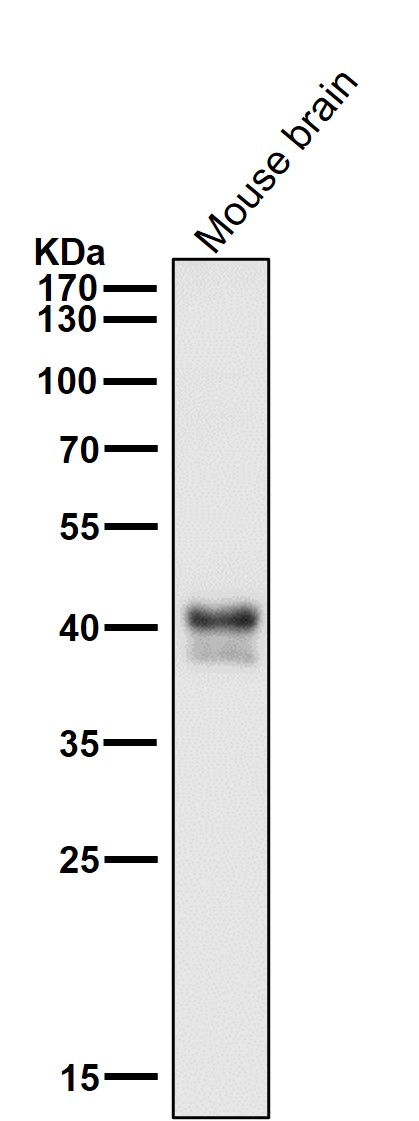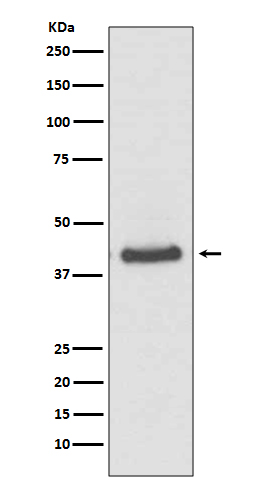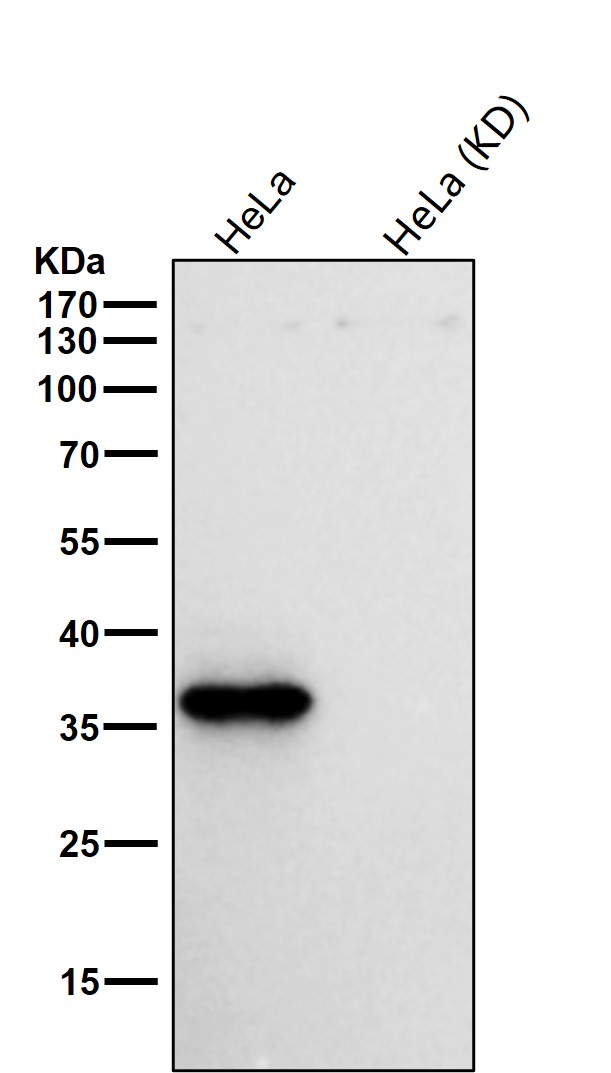


| WB | 1/1000-1/2000 | Human,Mouse,Rat |
| IF | 1/20-1/50 | Human,Mouse,Rat |
| IHC | 咨询技术 | Human,Mouse,Rat |
| ICC | 1/50-1/200 | Human,Mouse,Rat |
| FCM | 咨询技术 | Human,Mouse,Rat |
| Elisa | 咨询技术 | Human,Mouse,Rat |
| Aliases | JunB; Jun B; Jun B proto oncogene; Transcription factor jun-B;;JunB |
| WB Predicted band size | Calculated MW: 36 kDa ; Observed MW: 43 kDa |
| Host/Isotype | Rabbit IgG |
| Antibody Type | Primary antibody |
| Storage | Store at 4°C short term. Aliquot and store at -20°C long term. Avoid freeze/thaw cycles. |
| Species Reactivity | Human,Mouse,Rat |
| Immunogen | A synthesized peptide derived from human JunB |
| Formulation | Purified antibody in PBS with 0.05% sodium azide,0.05% BSA and 50% glycerol. |
+ +
以下是关于JunB抗体的3篇代表性文献及其摘要:
1. **文献名称**:*"JunB regulates homeostasis and suppressive functions of effector regulatory T cells"*
**作者**:Li Y. et al.
**摘要**:研究利用JunB特异性抗体揭示JunB在调节性T细胞(Treg)功能中的关键作用,发现其通过调控IL-10分泌维持免疫耐受及抑制自身免疫反应。
2. **文献名称**:*"JunB deficiency leads to persistent myeloid cell expansion, highlighting its role in inflammation control"*
**作者**:Passegué E. et al.
**摘要**:通过JunB抗体检测发现,JunB缺失导致髓系细胞异常增殖及慢性炎症,表明JunB在髓系细胞分化与炎症消退中的调控机制。
3. **文献名称**:*"Differential roles of JunB in angiogenesis and tumor growth"*
**作者**:Hartenstein B. et al.
**摘要**:利用JunB抗体研究其在肿瘤微环境中的作用,发现JunB通过调控VEGF信号促进血管生成,但抑制肿瘤细胞自身增殖,提示其双重功能。
4. **文献名称**:*"Antibody-based validation of JunB in epidermal differentiation"*
**作者**:Zenz R. & Wagner E.F.
**摘要**:通过特异性抗体证实JunB在小鼠表皮分化中的必要性,其缺失导致角质形成细胞分化异常及皮肤屏障功能缺陷。
(注:上述文献名为示例性总结,实际引用需核对真实发表信息。)
**Background of JunB Antibody**
JunB, a member of the AP-1 transcription factor family, plays critical roles in regulating cellular processes such as proliferation, differentiation, apoptosis, and immune responses. It dimerizes with other AP-1 proteins (e.g., Fos, Jun, ATF) to bind DNA and modulate gene expression. JunB is involved in diverse pathways, including TGF-β signaling, inflammation, and oncogenesis, with context-dependent roles in cancer progression—acting as either a tumor suppressor or promoter.
JunB antibodies are essential tools for studying its expression, localization, and function in biological systems. These antibodies are widely used in techniques like Western blotting, immunohistochemistry (IHC), immunofluorescence (IF), and chromatin immunoprecipitation (ChIP) to detect JunB protein levels, subcellular distribution, and DNA-binding activity. They are particularly valuable in research on diseases such as cancers, autoimmune disorders, and chronic inflammatory conditions, where JunB dysregulation is implicated.
Validated JunB antibodies exhibit specificity for target epitopes, often confirmed via knockout controls or siRNA knockdown. Their applications extend to preclinical studies, aiding in elucidating mechanisms of drug responses, immune cell activation, and tissue remodeling. Commercial JunB antibodies are typically raised in hosts like rabbits or mice, with reactivity across species such as human, mouse, and rat. Proper validation ensures reliability in both qualitative and quantitative analyses, making them indispensable for molecular and translational research.
×